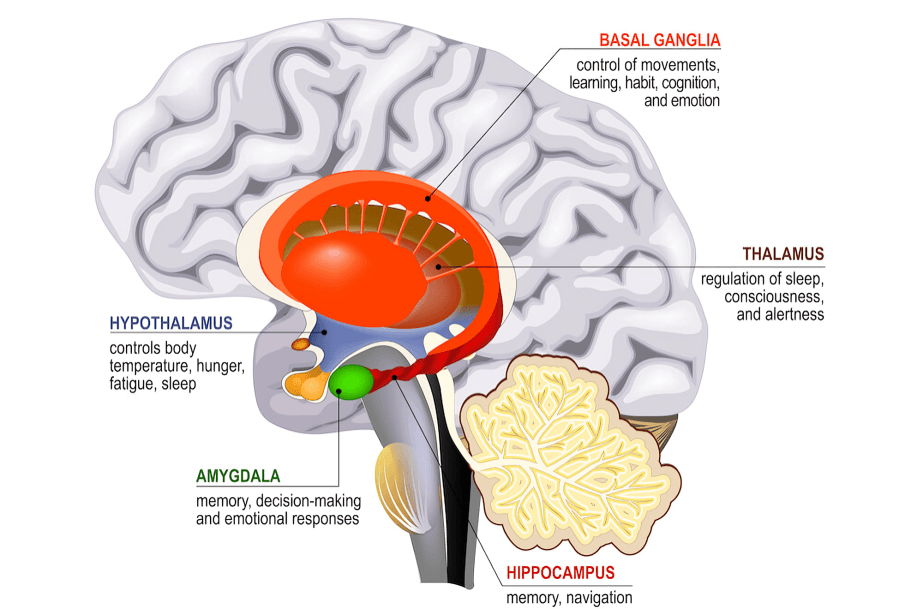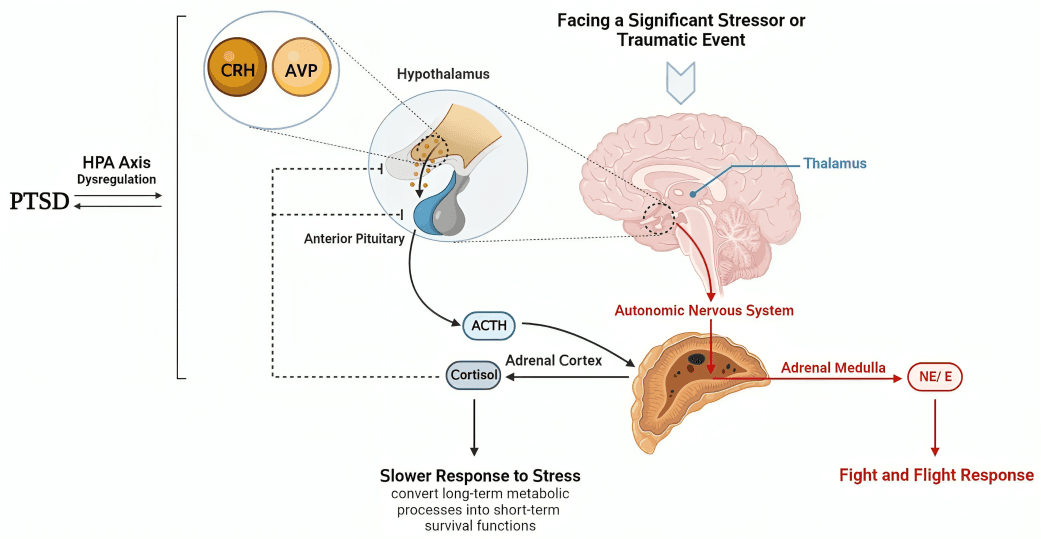
“
The role of the hypothalamus in emotion and behavior is crucial in understanding how the brain drives our instincts, moods, and reactions. This small but powerful brain region connects to key emotional circuits, regulating everything from aggression and fear to pleasure and attachment. 1
1
”
The hypothalamus regulates emotions by influencing the autonomic nervous system, controlling responses like heart rate, sweating, and breathing during strong emotional states such as fear or excitement.1
Linked with the limbic system, the hypothalamus helps process and express emotions like anger, pleasure, sadness, and sexual arousal by sending hormonal and neurological signals across the brain and body. 2

The hypothalamus directs emotional behaviors through its connections with the amygdala, which detects threats and triggers fight-or-flight responses that the hypothalamus physically coordinates.
Emotional eating and appetite changes often stem from the hypothalamus, which responds to stress and mood by releasing hormones like cortisol that influence food cravings.3
The hypothalamus affects mood regulation by producing hormones such as oxytocin and vasopressin, which foster emotional bonding, trust, and social connection in both romantic and familial relationships.4
The body’s reaction to fear, including rapid heartbeat and adrenaline release, begins in the amygdala but is carried out by the hypothalamus, which signals the adrenal glands to start the stress response. 5
The hypothalamus responds to pain by coordinating behavioral responses like crying, withdrawal, or aggression, while also initiating stress hormone release to prepare the body to handle emotional distress.6
It plays a vital role in pleasure by interacting with dopamine pathways and regulating sexual behavior, reinforcing emotional reward systems associated with physical intimacy and romantic attachment. 7
Emotional memory storage involves the hypothalamus via its communication with the hippocampus and amygdala, helping link past emotional experiences with present behavior and reactions.8

Hypothalamic imbalances, such as those caused by tumors or trauma, can lead to emotional disturbances, including rage, depression, or apathy, showing how structural damage affects emotional control.
The hypothalamus controls circadian rhythms that affect emotional stability; poor sleep regulation disturbs mood, often worsening anxiety due to disrupted hormone release from this brain region.9
Social recognition, an important emotional skill, relies on the hypothalamus, especially the release of oxytocin, which enhances memory of familiar individuals and supports empathy-driven behavior.10
The hypothalamus helps manage emotional suppression or expression depending on the context, especially through its influence on frontal lobe decision-making during emotionally intense social situations.11
In mood disorders like bipolar disorder, disrupted hypothalamic function alters hormone release patterns and sleep cycles, contributing to episodes of mania or depression through unstable emotional regulation. 12
The hypothalamus helps babies recognize caregivers and form emotional bonds by regulating oxytocin levels, laying the neurological foundation for secure attachment and future emotional development.13

Stress-coping strategies like deep breathing and meditation work partly by calming the hypothalamus, reducing sympathetic activity, and helping return emotional responses to balance.
The hypothalamus interacts with the brainstem to initiate facial expressions like smiling or frowning, helping express emotions outwardly in response to inner feelings, even subconsciously. 14
Animals with hypothalamic lesions show reduced social behavior and inappropriate emotional responses, confirming its central role in maintaining emotional context and behavioral appropriateness.15
During grief, the hypothalamus increases stress hormones and suppresses appetite and sleep, physically embodying emotional pain and showing how deeply emotion and body regulation are intertwined. 16
Philosopher-physician Avicenna proposed a link between emotions and body changes—an idea now confirmed by the hypothalamus’s role in connecting emotional states to physical responses.17


